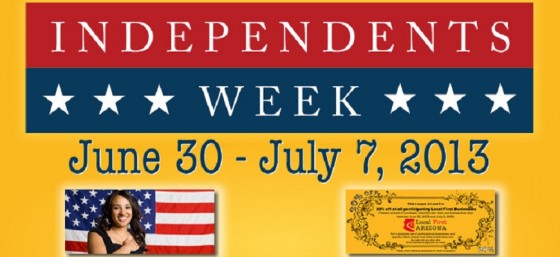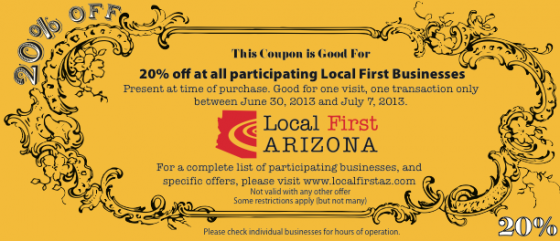 One of the things I love about being a solo attorney in Phoenix is I get to be part of Local First Arizona. This is an organization for locally-owned businesses and it’s a great place to meet and connect with amazing professionals in the state.
One of the things I love about being a solo attorney in Phoenix is I get to be part of Local First Arizona. This is an organization for locally-owned businesses and it’s a great place to meet and connect with amazing professionals in the state.
Independents Week is coming up June 30 – July 7, 2013. Local First created the Golden Coupon program for this week to celebrate these businesses and give you another reason to check out the independent businesses in your community. Dozens of businesses will be giving patrons a 20% discount if they shop with a Golden Coupon during Independents Week. Dozens of Local First members all over Arizona are participating. Check out the full list on the Local First website and my list of places I’m excited to visit on The Undeniable Ruth.
After seeing the success of last year’s Golden Coupon program, Carter Law Firm is participating in this year’s program and offering 20% off legal consultations. Since there are only so many hours in the day, the firm only requires you to contact us during Independents Week to get in on the discount. You can schedule the consultation itself anytime in July 2013 and use your Golden Coupon.
Here’s how to use your Golden Coupon with Carter Law Firm:
 Print the Golden Coupon from Local First Arizona.
Print the Golden Coupon from Local First Arizona.- During Independents Week (June 30 – July 7) contact the Ruth and say you want to book a legal consultation with your Golden Coupon.
- Schedule you appointment for any mutually agreed upon time during July 2013.
Please note, that you should schedule an appointment to talk about your business, intellectual property, social media, or flash mob law needs. All other legal questions are outside the firm’s scope of practice.
Don’t forget to check out all the other locally owned businesses that are participating in the Golden Coupon program. This is a great opportunity to try out a new place or revisit a business you love in your community.
You can connect with me on Twitter, Google+, Facebook, YouTube, LinkedIn, or you can email me. You can also subscribe to the Carter Law Firm newsletter.
Please visit my homepage for more information about Carter Law Firm.

